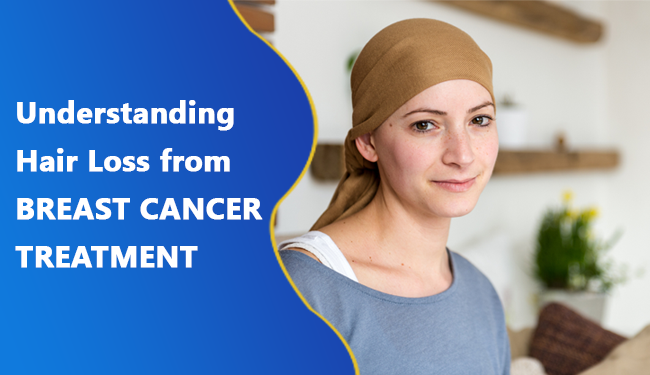

Hair loss is a common side effect of certain breast cancer treatments, particularly chemotherapy. The type of chemotherapy drugs used in breast cancer treatment targets rapidly dividing cells, and unfortunately, hair follicle cells are among those affected. The extent and nature of hair loss can vary depending on the specific drugs used, the dosage, and the individual's sensitivity to the treatment.
Chemotherapy-Induced Hair Loss:
Timing:
Usually, hair loss starts a few weeks after chemotherapy is started. Throughout the course of treatment, it could get worse before progressively getting better.
Extent:
The degree of hair loss might vary from little thinning to total baldness. It may also affect the eyebrows, eyelashes, and body hair in addition to the scalp.
Types of Chemotherapy Drugs:
Taxanes and Anthracyclines:
These are common classes of chemotherapy drugs used in breast cancer treatment. Taxanes (such as paclitaxel and docetaxel) and anthracyclines (such as doxorubicin) are known to cause hair loss.
Targeted Therapies:
A few targeted treatments, such trastuzumab and other HER2 inhibitors, may potentially be responsible for hair thinning.
Temporary Nature of Hair Loss:
Reversible:
In most cases, chemotherapy-induced hair loss is temporary. Hair typically begins to grow back after the completion of treatment, though the rate of regrowth varies among individuals.
Texture Changes:
Hair may initially grow back with a different texture or color, but it often returns to its original state over time.
Scalp Cooling/Cold Caps:
Reducing Hair Loss:
During chemotherapy, certain cancer clinics provide cold cap therapy or scalp cooling. In order to minimize hair loss, this technique involves chilling the scalp to lower blood flow and drug delivery to the hair follicles.
Wigs, Scarves, and Other Coverings:
Options:
Many individuals choose to wear wigs, scarves, or other head coverings during the period of hair loss. Some cancer support organizations provide free or low-cost wigs for those undergoing cancer treatment.
Emotional Impact:
Psychological Effects:
Hair loss can be emotionally challenging for many individuals. It may be helpful to seek support from friends, family, or support groups to cope with the emotional impact.
It's important for individuals undergoing breast cancer treatment to communicate with their healthcare team about potential side effects, including hair loss. They can provide guidance on available options to manage and cope with this side effect, and they may offer support resources to address both the physical and emotional aspects of the experience.